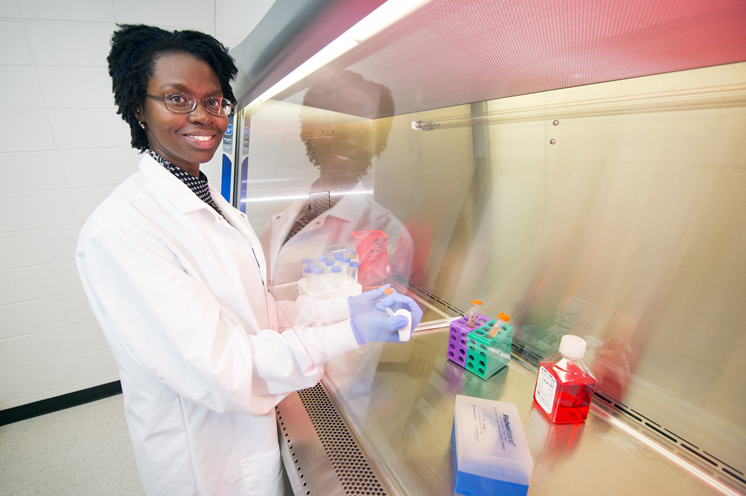Contact: James Carskadon
STARKVILLE, Miss.—A Mississippi State University researcher is developing new miniature models to better understand the factors that lead to heart disease and sickle cell anemia.
Renita Horton, assistant professor of agricultural and biological engineering, is using clear polymer “chips” to create cellularized microtissue models, which she then uses to study the mechanisms that lead to cardiovascular related diseases. She hopes this work can aid in improving patient outcomes by identifying novel targets that can be exploited to mitigate some of the organ damage caused by sickle cell disease.
“In Mississippi, cardiovascular disease is a huge problem,” Horton said. “If we can understand the factors that contribute to the disease, we may be able to identify strategies to better treat, if not prevent, the disease. Our aim is to create models that can generate results which can reliably show what one might observe in the body during disease.”
 Horton came to MSU in March 2016 after completing a postdoctoral fellowship at Harvard University’s Wyss Institute for Biologically Inspired Engineering. Horton established the Cardiovascular Tissue Engineering Laboratory in MSU’s Department of Agricultural and Biological Engineering. The Lexington native is hopeful her research will enhance understanding of vaso-occlusions, a painful complication of sickle cell anemia, and other mechanisms that contribute to organ damage and ultimately death in sickle cell patients. Horton was motivated to pursue this area of research after her older sister lost her battle to the disease.
Horton came to MSU in March 2016 after completing a postdoctoral fellowship at Harvard University’s Wyss Institute for Biologically Inspired Engineering. Horton established the Cardiovascular Tissue Engineering Laboratory in MSU’s Department of Agricultural and Biological Engineering. The Lexington native is hopeful her research will enhance understanding of vaso-occlusions, a painful complication of sickle cell anemia, and other mechanisms that contribute to organ damage and ultimately death in sickle cell patients. Horton was motivated to pursue this area of research after her older sister lost her battle to the disease.
Horton received her undergraduate degree from MSU in chemical engineering in 2005. She first became affiliated with Harvard when she participated in a National Science Foundation funded research experience for undergraduates summer program at the university’s Materials Research Science and Engineering Center. After graduating from MSU, Horton went on to receive a master’s and doctorate from Harvard in engineering sciences with a concentration in biomedical engineering.
Approximately six undergraduate and master’s students work in Horton’s Cardiovascular Tissue Engineering Laboratory. The lab designs biomimetic microsystems, which can mimic features of specific organs to predict the organ’s response to different stimuli. In vitro models, such as those Horton uses, can serve a wide range of research purposes, reducing the risk to human or animal subjects. For example, cardiomyocytes, the cells that cause the heart to beat, can be cultured within the chips and then treated with different drugs to see the effects.
“With our microfluidic based models, we can look at what’s happening in a system, isolate a certain portion of that, and then start to ask questions on a more focused scale,” Horton said. “We know that many different cells make up the heart and make it function, but with heart disease, we’re really interested in when the heart starts to dysfunction. In our case, we start by manipulating cardiomyocytes to understand how they respond to changes in the microenvironment to enhance our understanding of disease onset. As we go along, we can build more complexity into our system to more closely mimic the whole organ.”
As her research moves forward, Horton hopes to strengthen recent collaborations with University of Mississippi Medical Center, which has a clinic for sickle cell patients. With her chips, Horton will examine environmental factors that lead to vaso-occlusion. The end goal, Horton said, is to use her small chips to have a big impact on the well-being of humans.
“If you have a positive or an adverse effect in the chip, this may suggest that a similar effect will likely be observed in a human or in animals,” Horton said. “That’s a huge benefit to some of the in vitro work we’re trying to do here. The ultimate goal is finding solutions to help the patient. We want to use this not just to make observations, but to create something that’s practical.”
For more on the Department of Agricultural and Biological Engineering, visit www.abe.msstate.edu.
MSU is Mississippi’s leading university, available online at www.msstate.edu.